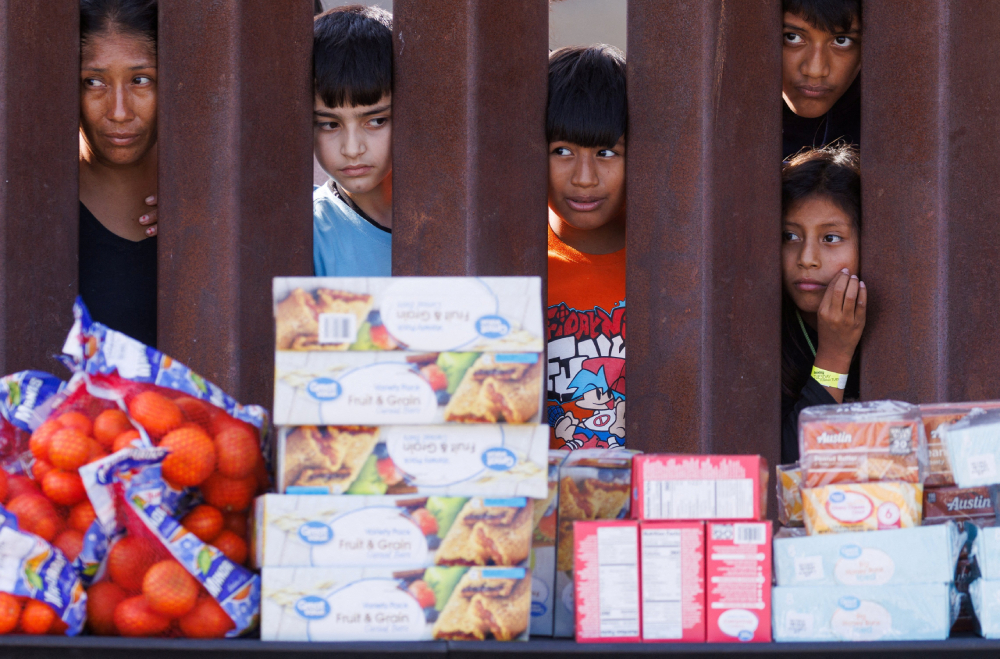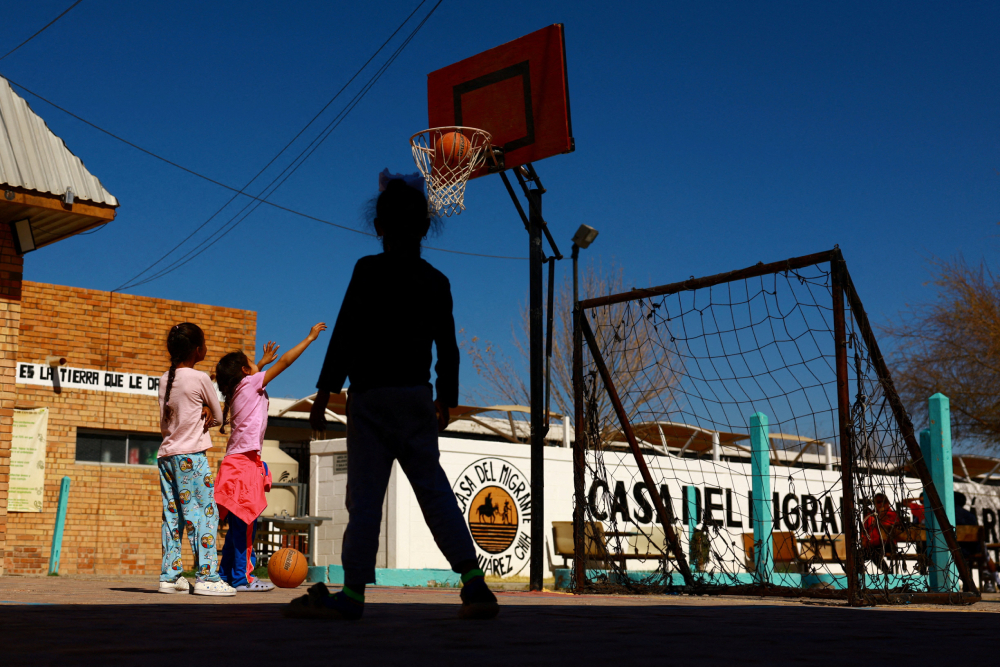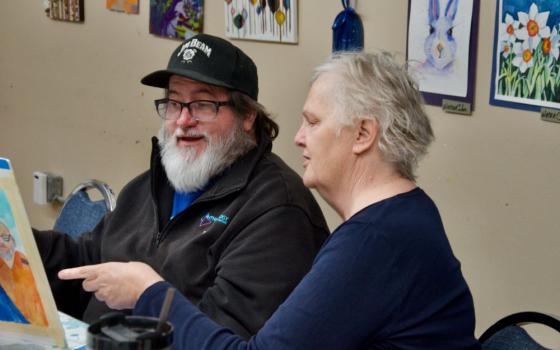
Migrants look through the border fence Sept. 12, 2023, toward food brought by aid workers after gathering between the primary and secondary border fences at the U.S.-Mexico border to wait for processing by U.S immigration officials in San Diego. (OSV News/Reuters/Mike Blake)
On March 21, the Trump Administration essentially ended funding for legal services for unaccompanied immigrant children, a move the Catholic Legal Immigration Network, known as CLINIC, said will affect about 26,000 children who may have to represent themselves in immigration court.
The funding ended when the government terminated its contract with the Acacia Center for Justice, which contracts with the government to provide legal services through its network of providers around the country to unaccompanied migrant children under 18. It does this both by providing direct legal representation to migrant children who cross the border alone and are in federal government shelters, as well as conducting legal orientations, which are often referred to as "know your rights" clinics.
Some children in the system are as young as 2 years old.
Legal aid clinics that had been providing the services sued, and on April 1 a federal judge in California ordered the reinstatement of the contract through April 16, saying that ending it without ensuring the children have legal counsel violates a 2008 anti-trafficking law, The Associated Press reported.
But, according to AP, the providers say they're still in limbo because they're waiting to hear from the government on how to proceed, and have no idea when — or if — funding will resume.
The 2008 law created special protections for migrant children, who are often either too young to speak, are too traumatized, or don't know English.
"It puts innocent lives at risk if children face deportation because they did not receive due process," said CLINIC executive director Anna Gallagher.
Advocates point out that legal representation is critical: The Transactional Records Access Clearinghouse at Syracuse University, which collects and compiles immigration data, found that from 1998 to 2025, immigrants in 736,315 cases who had an attorney were granted relief from deportation. Only 71,266 immigrants without an attorney were granted relief.
Meanwhile, 778,384 immigrants with attorneys in that time period were deported; more than 3 million without attorneys were deported.
TRAC had also compiled statistics on unaccompanied minors, but stopped doing so in 2017 because the government's data was so unreliable. But from 2005 to 2017, its data shows that 8,942 children with legal representation were granted relief from deportation, but only 308 without an attorney were granted relief.
Meanwhile, 25,749 children with attorneys were deported, while nearly triple that amount, 75,662, without attorneys were removed, its data shows.

Migrant girls play at the Casa del Migrante shelter in Ciudad Juarez, Mexico, Feb. 22, 2025. (OSV News/Reuters/Jose Luis Gonzalez)
"Children should never be expected to represent themselves in court, period," said CLINIC executive director Anna Gallagher in a statement decrying the government's attempt to end funding. "Unaccompanied immigrant children are some of the most vulnerable people in our legal system — little ones who have fled violence, abuse, and deprivation in their home countries. Stripping funding for their legal assistance is unconscionable; it puts innocent lives at risk if children face deportation because they did not receive due process."
Intercultural workshops and debt help
The National Religious Vocation Conference has a slew of events coming up, including a workshop on assessing candidates for religious life through the lens of interculturality, which will be offered in three different locations.
The workshop, by Crystal Taylor-Dietz, from 9 a.m. to 3 p.m. on June 13 in Huntingdon Valley, Pennsylvania; Sept. 2 in San Antonio, Texas; and Oct. 18 in Frankfort, Illinois.
Organizers say the workshop will explore how to assess candidates who come from a different culture, taking into account factors such as distinct norms and expressions, and possible trauma. One focus will be on how to respectfully gather information without stereotyping, generalizing, or minimizing behaviors of concern. Attendees will also explore possible blind spots and biases that can creep into assessment.
Registration is open now for the June workshop and will open later in the year for the September and October dates.
The National Fund for Catholic Religious Vocations is accepting grant applications through April 25 to assist with education debt. Grants are available only to current NRVC members and must be used for paying educational debt of a candidate to religious life. Learn more here, or contact Phil Loftus at 312-318-0180 or ploftus@nfcrv.org.
May 11, Good Shepherd Sunday, will be the World Day of Prayer for Vocations. This commemoration is an opportunity to pray for and promote vocations to consecrated and ordained life.
The NRVC has developed a downloadable prayer intentions resource that communities can adapt (in Spanish here), while Pope Francis has released a message for the occasion, which he ties to the Jubilee, calling it "Pilgrims of Hope: The Gift of Life." Find further details, resources, and ideas here.
Stations of the Cross for Justice
Holy Week is approaching, and the Catholic social justice lobby Network is inviting you to pray the Stations of the Cross, but in a way that calls for justice for all, rather than a few billionaires.
The Stations of the Cross for Justice draws on materials from its "Give Up Billionaires for Lent" campaign. "No matter who we are, where we live, or the color of our skin, Catholics and people of faith across the country agree that taking food and health care from our families to make the ultra-wealthy richer is just plain wrong," the campaign says.
Network's event creator lets you fill in your information, and then it creates an event page that's easy to share on social media. After you fill it out, the full toolkit and script will be emailed to you on April 8.
Organizers say the Stations will give public witness to the many injustices in the world today, and prayerfully calls on Congress to act for all people, not just the ultra-wealthy.
Advertisement
Benedictine sisters cheer canceled PA plastic facility
The Benedictine Sisters of Erie were among groups applauding the cancellation of a plastic waste facility proposed for northwestern Pennsylvania that opponents said would have exacerbated pollution in two states.
On April 3, International Recycling Group (IRG) announced it had abandoned plans to build a $300 million facility in Erie to convert plastic waste into recycled plastic materials — as much as 100,000 tons annually — and fuel pellets for a steel mill in Gary, Indiana.
Plastics manufacturers and fossil fuel companies have touted such "advanced recycling" techniques as a solution to the global problem of plastic pollution. But critics have cast such efforts as "greenwashing" that extend polluting industries and distract from the core issue of reducing the amount of plastic created.
Currently, 400 million tons of plastic is produced annually, a total expected to triple by 2060. Meanwhile, less than 10% of plastic globally is recycled, and many forms of plastic currently cannot be recycled due the complex blend of chemicals in end products.
The IRG plant's cancellation represents "a win for Lake Erie," said Benedictine Sr. Anne McCarthy, coordinator for the congregation's peace and justice ministry. She added the sisters have been concerned by the plastic pollution generated by IRG.
"We hope Erie will join the fast-growing labor force for truly renewable energy and create even more jobs than those promised by IRG," McCarthy said in a statement.
Environmental and community groups warned that beyond expanding the use of plastics, the plant's operations would worsen public health in Erie and Gary — areas historically overburdened by pollution — as well as endanger the Great Lakes and Indiana Dunes National Park.
The company said the project, which would have been the largest facility of its kind in the country, would have diverted plastics from entering landfills and created 300 jobs.
IRG cited recent tariffs imposed by President Donald Trump and uncertainty around a $182 million Energy Department loan, using Inflation Reduction Act funds, for canceling the project, the Erie Times-News reported. The project drew support from the Erie Regional Chamber and Growth Partnership and the Pennsylvania AFL-CIO.







